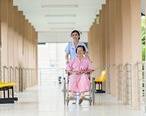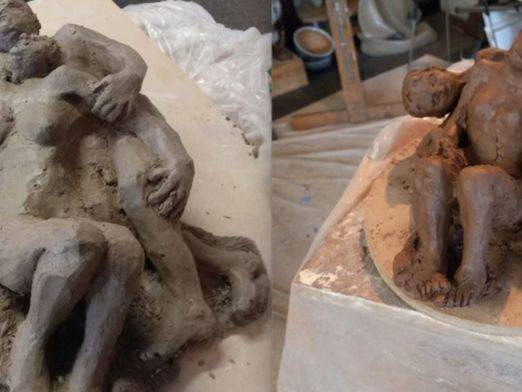What Loss Looks Like During Covid
Have you lost a loved one during covid and struggled to find ways to grieve while separated from family? Like tens of thousands of older Americans, Jeanne has found herself in the challenging position of navigating the processes of grieving and adapting to life on her own within the unique constraints of the covid world.

Jeanne Raffo beat cancer at age 74, and 11 years later, she has faced the covid-19 pandemic with the same resolve. Next to her bed, a card hangs that reads: “Then, when it seems we will never smile again, life comes back” — a daily reminder that tough times don’t last forever.
Ever since she lost her husband of 59 years to covid back in April, Jeanne has needed this resolve more than ever. Like tens of thousands of other older Americans, Jeanne has found herself in the challenging position of navigating the processes of grieving and adapting to life on her own within the unique constraints of the covid world. These processes are hard under any circumstances, but as covid continues to be disproportionately fatal for those over 65, more and more people like Jeanne are going through them under conditions that are particularly difficult—but finding creative and unconventional ways of handling them.
Before covid, Jeanne would visit her husband Tom every day at the nursing home where he stayed. But in mid-March, visitors were prohibited and her routine was upended. Just a few weeks later, she heard rumors that the nursing home was experiencing the beginnings of an outbreak despite these precautions. Next, she caught wind that Tom was among those with symptoms. With staff busy and overwhelmed, communication with Tom was difficult.
“I couldn’t be with him. That was the hardest part,” Jeanne says. “If I could have been there everyday, maybe it wouldn’t have been so bad.”
As Tom’s condition worsened, Jeanne and her three children were able to set up a conference call to say goodbye as a nurse held her phone to Tom’s ear. In the days that followed, her children and grandchildren continued to use technology to stay connected. They set up Zoom calls to check in with each other, making use of the new platform that many of them had just begun using for work and school. Jeanne was grateful that technology was making it easier to stay in touch despite the quarantine, but she didn’t know how to use Zoom and needed one of her grandchildren to put her on speaker phone next to their computer. Meanwhile, Jeanne’s son shared the sad news on Facebook, and over Zoom, read aloud all the comments from old friends and family. Many people whom they’d known throughout their long marriage offered their condolences.
Jeanne also leaned heavily on email throughout her isolated grieving process. “It has been wonderful keeping in touch with my friends and family by sending emails. That technology has been very, very comforting.”
Five months later, an in-person funeral was safe and possible. The priest at the church where Jeanne and Tom were married agreed to hold a service for no more than 10 people, and they spread out in the pews and wore masks. She felt much better after finally being able to lay him to rest.
Not only did the pandemic transfigure the way Jeanne and her family were able to grieve, it has also shaped her decision-making about her plans for her future without Tom. After his death, she began considering a move into a community that offers both independent and assisted living. She wanted to be somewhere where she could meet new people. Like many, however, she is wary to make the move during covid. While big outbreaks have been more destructive in nursing homes like Tom’s than the kinds of independent and assisted living facilities she is considering, Jeanne knows she will be less likely to be exposed if she stays in her own home. At the same time, as she herself ages, her children worry about her living on her own for too much longer.
Meanwhile, returning to her hometown for her husband’s funeral also got Jeanne thinking about moving back there for her next phase.
“I feel my roots there,” she says.
Indeed, covid has led many to reconnect with their roots, as everyone from college students to those facing mid-career unemployment, caregiving challenges, or city claustrophobia retreat to their hometowns. Rural towns like Jeanne’s in the Catskill Mountains of New York have become particularly attractive in the covid era.
The problem is, “there’s no medical help up there,” Jeanne says. “If I need emergency care I would have to travel 20 miles. I do love it there, but it doesn’t make sense. I know I can’t move back.”
Ultimately, Jeanne has decided to hold off on making a move for the time being.
“Life seems like it’s in limbo. I don’t know what to do. I don’t know whether to stay or go. I’m going to stay until I see what the virus is going to be doing. For now, think I better stay here.”
What is a hard transition to make even under normal conditions has become all the more perplexing for older Americans dealing with covid’s fallout.
As Jeanne and so many others like her grieve and plan for the future in covid’s shadow, many take comfort in knowing how many others are grappling with the same hard questions.
“It makes me feel like—hey, I’m not the only person going through this. And a lot of people have it a lot worse than I do.”
Have you lost a loved one during covid and struggled to find ways to grieve while separated from family? Has technology made it easier? Have you tried to plan a late-in-life move? What have you struggled with the most? Join the conversation in the comments below.














What an amazing woman!
I am in a very similar position I am in D.C. and the kids in Boston.
What a great story of facing life’s challenges bravely. People who have lived more of life build a special type of resiliency.